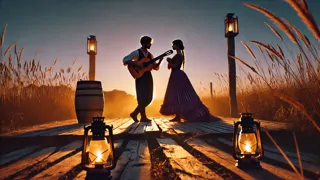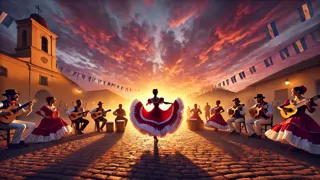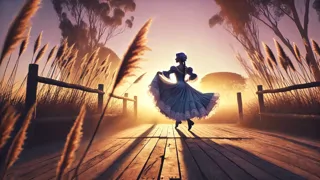Introduction
Before dawn has fully stretched its rosy arms across the Argentine pampas, Sofía Morales steps onto the old wooden platform built by her abuelo, breathing in the lingering chill of night. The sky gleams faintly, a pale lavender ribbon over endless grass, and the orchard of eucalyptus trees behind her whispers gently with the breeze. In the growing light, every tiny blade of grass seems to glow, and the wooden floorboards tell stories of dances long past, of swirling skirts and booted feet stamping rhythms into the earth. Sofía’s dress, pale blue with white lace at the hem, brushes the old boards; she lifts her chin, recalls the measured steps her mother taught her at the tender age of five. Her heart pounds to the quiet hum of cicadas, as steady as the pulse of the Zamba that has woven itself into her blood. This morning, she rehearses alone for the annual Festival del Alba, where her family’s troupe has performed for generations. It should feel safe, familiar—yet every breath in her lungs tastes of both anticipation and dread. For yesterday, a wandering musician named Martín offered her a different song: a tender, yearning melody on his guitar that called to something inside her she couldn’t name. Tradición or corazón—tradition or heart. As the first beams of sun stretch wide across the horizon, Sofía closes her eyes and lifts her arms, feeling the memory of her mother’s gentle guidance and Martín’s warm laughter mingle within her. The choice closing in on her is simple in its cruelty: follow the path carved by those who came before, or chase the promise of a new rhythm she may never fully master.
Roots in Rhythm
Sofía’s earliest memories come wrapped in the warmth of her abuela’s embrace and the echo of sole leather against polished wood. From the time she could barely walk, she had felt the call of the Zamba—a dance as old as the land itself, born from Spanish guitars and indigenous rhythms, carrying in its steps a history of longing, resistance, and celebration. She would press her tiny feet against her abuela’s worn boots, watchting the intricate patterns traced across the floor with devotion. Than at night, the lullaby of wind through the quebracho trees reminded her of drumbeats, urging her to dream in time.

Now in her early twenties, Sofía stands at the edge of that lineage, a celebrated dancer in her own right. Her mother, Elena, a former prima at the Festival del Alba, has taught her every swirl, every pivot, every soft stomp that gives the Zamba its quiet power. When competition season dawns in Buenos Aires, Sofía’s reputation for authenticity—embracing the subtle interplay of arms, hands, and shifting weight—spreads among aficionados and folklorists who hail her as a preserver of true Argentine ethos. Yet while she bows with practiced modesty, she often retreats afterward to a small courtyard behind her home, where she allows herself to question the fairness of strict tradition.
That courtyard became the setting of her first encounter with Martín, a musician whose guitar case rattled through local villages in search of meaning. Martin’s brassy tenor and soft eyes struck her as something wild and free, unburdened by the demands of repetition and inheritance. When he arrived at her family’s rehearsal hall under the wayward lantern light of dusk, he carried songs of love, longing, and wanderlust. And in her heart, a spark ignited. Yet each time they met, as he coaxed gentle chords into the night air, she felt the tug of all her ancestors behind her—watching, waiting. They had danced this same story of resilience year after year; the Festival del Alba was not just a performance, but a reaffirmation of identity for the entire community. The path ahead offered two blinking lights: one led toward the comforting cadence of legacy, the other into Martina’s melodic horizon. In the hush between guitar strings and quietly tapping boots, Sofía felt her life’s rhythm splinter in two.
A New Melody
When Martín returned the next morning, ambition drove him as much as devotion. He found Sofía stretching at the edge of the plateau, the wind tugging at her braid and sash. He leaned the guitar against a nearby barrel and offered her a smile that held both apology and promise. “I didn’t mean to disturb,” he said, “but there’s a song I wrote under these skies.” He coaxed the instrument into his grasp, and she felt the fine hairs on her arms lift at the first plucked note. The melody was neither Zamba nor tango; it carried an unfamiliar heartbreak, a tender ache that seemed to swell from the very plains around them.

They practiced together—he on guitar, she on the wooden stage—and soon rhythm found resonance in the space between them. Each practiced until twilight, and Sofía discovered that her feet felt lighter in Martín’s impromptu patterns, as though the ground itself was reshaped by new possibilities. She taught him the measured tempo of the Zamba: how her wrist flicked, how her foot brushed the floor on a half-count. He responded with inventive syncopations on the guitar, melding his chords with her heartbeat. Their creative communion felt like a secret vow—so rare, so intimate—that Sofía believed it could upend even the strictest traditions.
But when her mother learned of the private rehearsals, she frowned with hurt tempered by disappointment. “The dance is not yours to reshape,” she said softly that evening beneath the bristly shadows of the pampas grass. “It belongs to those who carried it before you.” Sofía’s chest tightened with a familiar ache: the tension between honoring the stories of her forebears and listening to the song of her own spirit. Martín’s voice, husky with longing, called to her in dream and day, yet she feared the gulf that stood between the secure foundation of her roots and the uncharted horizon he offered. Now every note he struck, every step she traced, seemed bound in contradiction. Was love strong enough to reshape an entire legacy, or would it crumble at the weight of expectation?
Festival of Dawn
The eve of the Festival del Alba arrived crisp and clear. Straw-roofed stalls lined the dusty main street of the village, colorful textiles billowed under lantern light, and the scent of asado mingled with the tang of empanadas. Upstairs in the modest inn, Sofía stared at her reflection in the mirror: a daughter of proud lineage, skirts layered in crimson and white, face painted with the delicate strokes of stage makeup. In her chest, her heart hammered with a wild rhythm that was neither Zamba nor Martín’s song but a fierce drumbeat of choice.

Downstairs, her troupe waited. Her mother’s face was set in an icy calm, eyes bright with the knowledge that tonight would shape the narratives told in living rooms for generations to come. Sofía stepped onto the wooden platform under the open sky, the first murmurs of wind carrying voices from the crowd—friends, neighbors, distant relatives. Martín’s guitar, strung with fresh strings, leaned against the stone wall just beyond the ensemble’s arrangement of calabash rattles and bombo drums. She fixed her gaze on the horizon, where the moon dipped low, giving way to the crimson promise of sunrise.
And then the music began: a deep drumroll, tremulous and urgent, and guitar chords woven with plaintive grace. Sofía launched into the steps she had practiced since childhood—rise, turn, half-turn, shimmy of the hips—every motion a testament to the lineage that had shaped her. But after the first refrain, something shifted. Martín’s chords slipped into a tender bridge, and Sofía felt the warm surge of his melody echo in her bones. In that instant, she saw her path split clear: one direction traced the well-worn arcs of tradition, the other a slender thread of dawn-light leading toward an uncertain love.
She paused at the center of the stage, heart thundering, and let the hush of the crowd fill her. The wind stilled. The dancers behind her froze in place. And in that breath, Sofía chose—to step forward into Martín’s embrace of song, to carry the Zamba with new traces of her own heartbeat. Her feet found a new pattern: a fusion of old and new, each motion honoring the past while heralding a fresh promise. The crowd gasped, then erupted into applause as sunlight brightened the sky. In her mother’s eyes, Sofía saw surprise alight, then pride kindle. The Zamba lived on, reborn through her courage and her heart, an unbroken thread woven through yesterday and tomorrow.
Conclusion
When the final notes of Martín’s guitar faded into the morning breeze, Sofía stood at the edge of the stage, wrapped in the resonant hush that follows revelation. The villagers gathered close, faces flushed with joy and wonder, as the first ball of sun peeked above distant hills. In the hush, Sofía saw her mother step forward, tears glinting in her eyes, then open her arms wide. Their embrace held the weight of generations—the hopes and sacrifices of those who first shaped the Zamba—and the bright promise of a new chapter. Martín joined them, guitar in hand, his fingers still humming with chords unsung. As Sofía linked arms with both her mother and her love, she realized that tradition need not be a chain, nor love a rebellion. Instead, each step she danced from this moment on would carry the stories of her ancestors and the fresh melody of her own heartbeat in perfect balance. In that quiet dawn, on that worn platform, she discovered that courage is not choosing one path over another, but weaving them together to craft something richer than either alone—a living dance that honors yesterday, breathes today, and beckons tomorrow with open arms. And so the Zamba endures, its spirit alive in every footfall, every chord, every brave heart willing to find harmony between past and possibility, between heritage and love, between self and soul—forever dancing into the dawn.
With her final curtsy, Sofía stepped off the stage as the crowd rose to their feet. The morning sun had fully risen, golden on the pampas, and a new song filled the air—one she would carry forward, one she had helped create. It was a song of tradition, reimagined, and of love, firmly rooted in courage. It was, quite simply, the Dance of the Zamba renewed for generations to come.

















